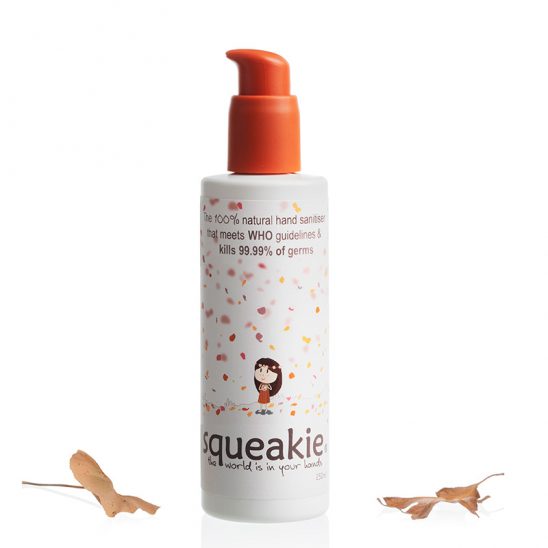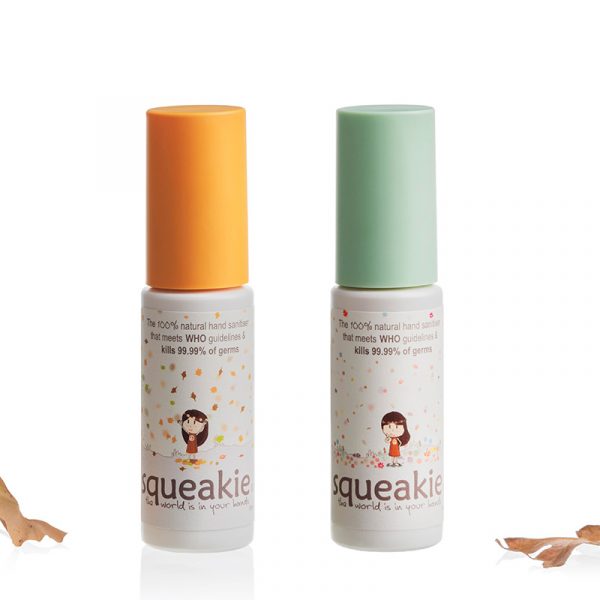
What type of alcohol is in your hand sanitiser?
May 18, 2020Did you know that most alcohol hand sanitisers are petroleum derived?
Did you know that your alcohol based hand sanitiser contains unlisted toxic denaturants?
And that even plant based alcohol hand sanitisers contain unlisted toxic denaturants?
Read on as to why Squeakie stands alone in its choice of alcohol & ingredients…
Alcohol based hand sanitisers (with 60% to 80% alcohol) are the only hand sanitisers that are recommended by the WHO, CDC, EWG, and health authorities universally across the world.
If you check the ingredients list you’ll find that most hand sanitisers are either fossil fuel derived, highly drying alcohol (isopropyl alcohol, n propanol) and/or the ethanol is denatured.
If it has been denatured, the toxic denaturant chemicals like methanol, phthalates or acetone won’t be listed on the label. Often you’ll find with these kind of hand sanitisers, when you use them before eating food with your hands, food will taste bitter.
Also check if the formula mainly synthetic and petroleum derived? Does it include PEGS that are suspected of containing carcinogenic contaminants?
Squeakie uniquely use no toxic unlisted denaturants or nasty chemicals…
We’re so passionate about our Squeakie formula because we know we’re keeping your body free from everyday toxic chemicals, reducing your synthetic chemical burden and looking after the long-term well being of you and your family. Squeakie’s pure and sustainable milk whey alcohol is derived from cow milk. The lactose or milk sugar in the whey is fermented by lactose specific yeast, which metabolizes the lactose to produce alcohol.
Squeakie is free of petroleum derived, highly toxic isopropyl alcohol, n propanol or unlisted toxic ethanol denaturants like methanol, acetone, acetaldehyde, ethyl acetate, diethyl phthalate or denatonium benzoate.
Squeakie is also free from a host of nasty chemicals and unsustainable petroleum by-products like propylene glycol, carbomer, acrylates, synthetic dyes, polysorbate 80, edta, isopropyl myristate, pegs, deas, triethanolamine, parabens, and the innocuous “fragrance” or “parfum” that contains about 14 unlabelled ingredients including phthalates and other hormone and allergy inducing chemicals (EWG). Acrylates, coal tar dyes, pegs, polysorbates and triethanolamine – all common big brand ingredients – may contain hidden carcinogens (Cancer Coalition Prevention, USA). Cheap to make but bad for our health and planet.
Why is alcohol the best to kill germs?
Because alcohol gives broad spectrum and fast acting protection, killing germs in 15 seconds flat.
Alcohol kills germs by disrupting the coating of bacteria particles and deactivating the bacterium. According to the Association for Professionals in Infection Control and Epidemiology (APIC) guidelines for Infection Control Practice, “Alcohols applied to the skin are among the safest known antiseptics.”
60% to 80% alcohol are the guidelines for WHO, CDC and the Australian Government Department of Health.
Anything less than than 60% does not meet WHO guidelines (and there are a lot of them out there which is really irresponsible).
In a healthcare setting, the CDC recommends 60% ethanol, (Squeakie’s pure milk whey alcohol is ethanol) or if the alcohol is isopropanol, it should be 70%. Isopropanol is a fossil fuel derived & highly drying alcohol.
https://www.cdc.gov/coronavirus/2019-ncov/hcp/hand-hygiene.html
An 80% formula can be less effective than a 60% alcohol formula.The water in the sanitiser can keep the alcohol from evaporating too fast, allowing the virus to be drenched for longer. Water is also needed for the process that interferes with protein function.
The high-alcohol-based sanitisers (60 to 80%) are the most effective at killing not only the bacteria but the particular types of virus. They do so by disrupting their outer membranes or envelope, and that won’t happen unless there’s at least 60 per cent alcohol content.
https://www.who.int/emergencies/diseases/novel-coronavirus-2019/advice-for-public
https://www.abc.net.au/news/2020-04-02/coronavirus-hand-sanitiser-may-not-be-effective/12110170
As to alcohol free or long lasting protection hand sanitisers, read our blog here, as to why these are far inferior, and the risk of using them…
‘Alcohol free’ or ’24 hour’ hand sanitizers- don’t go near them- here’s why…
SPRAYS KILL LESS GERMS
Sprays are good to disinfect surfaces but your hands need to be coated in a gel and cleaned for 20 seconds (like hand washing) for maximum germ killing efficacy and coverage. Sprays light coverage don’t kill as many germs. Gels provide more germ protection than sprays and foams. Gels are easier to spread on the palms and helps in cleaning the fingers, in between fingers, fingernails and tops of hands.
Squeakie is the gold standard in clean hand sanitiser ingredients and germ killing efficacy and coverage.
We have looked at every aspect of hand sanitisers and included the best possible option for you 🙂
You can buy your Squeakie now at our Squeakie Shop.
https://www.squeakie.com.au/shop/
of kindess, inspiration & health
buy squeakie
Our Squeakie Kindness Kit includes 2 x Squeakie 50ml bottles. One for you and one for a friend. Kindness can change the world.



